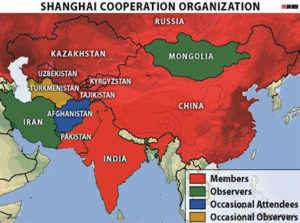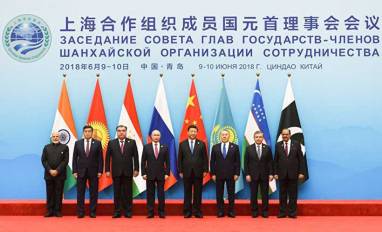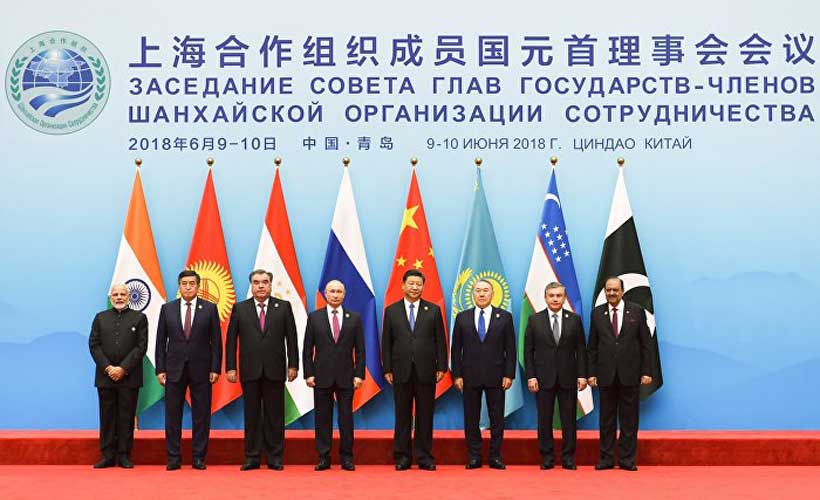The Shanghai Cooperation Organisation (SCO) is a political, economical, energy and security alliance which was established in June 2001 between Russia, China, Kazakhstan, Kyrgyzstan, Tajikistan and Uzbekistan. SCO is one of the largest regional groupings which is a counter to NATO. The Heads of State Council (HSC) is the supreme decision-making body in the SCO, it meets once a year and adopts decisions and guidelines on all important matters of the organisation. Military exercises among members are conducted regularly to promote coordination against terrorism, and to maintain regional peace and stability. India and Pakistan became full time members of the SCO in June 2017. For the first time, the military of India and Pakistan are taking part in a joint military exercise in  Russia as a part of the peace mission 2018, to promote mutual trust, cooperation and coordination against terrorist threats and to maintain regional peace and stability, conducted by the member states of the organisation. The SCO can be a driving force to bring peace between India, China and Pakistan. This is the first time ever that India, China and Pakistan entered in a joint mission of military training along with other countries. This is an opportunity for India to improve its bilateral relations with both Pakistan and China. As a matter of fact, when India and Pakistan became a part of the SCO a series of agreements were signed which included various parameters that both countries agreed upon. One of the key points of the agreement was to have peaceful and friendly relations with all the member countries and not see each other as opponents or enemies. Since both the countries have agreed upon it, they are bound by responsibility and the contract to implement it. The SCO has opened a new channel of communication for both the countries as it is mandatory for all the member states to participate in the yearly dialogue. After the 2016 Pathankot attack, the relations between India and Pakistan were strained and the bilateral talks also stopped. As part of the SCO membership, officials of both the countries will have to join the activities of the organization together. Apart from this, India gets an opportunity to engage with Central Asian or Eurasian countries to address its security concerns like terrorism and participating in SCO’s counter terrorism activities. One more benefit is that Central Asian countries have energy reserves which can help India meet the rising energy demand. The member states itself possess a quarter of world’s oil resources, one third of world’s has resources and almost half of the world’s explored uranium. The SCO membership can also be India’s gateway to gaining supply of energy resources mainly from Russia, Kazakhstan and Uzbekistan. There can be a point when India and Pakistan would disagree as both the countries are trying to build a strategic partnership with the Central Asian countries. While India is trying to have closer trade and political ties with Russia, Kazakhstan, Tajikistan and Uzbekistan to import petroleum, natural gas and uranium by constructing pipelines, Pakistan is also looking forward to having closer ties with Afghanistan, Tajikistan and Kyrgyzstan under the CASA 1000 project as well as with China, Kazakhstan and Kyrgyzstan under the
Russia as a part of the peace mission 2018, to promote mutual trust, cooperation and coordination against terrorist threats and to maintain regional peace and stability, conducted by the member states of the organisation. The SCO can be a driving force to bring peace between India, China and Pakistan. This is the first time ever that India, China and Pakistan entered in a joint mission of military training along with other countries. This is an opportunity for India to improve its bilateral relations with both Pakistan and China. As a matter of fact, when India and Pakistan became a part of the SCO a series of agreements were signed which included various parameters that both countries agreed upon. One of the key points of the agreement was to have peaceful and friendly relations with all the member countries and not see each other as opponents or enemies. Since both the countries have agreed upon it, they are bound by responsibility and the contract to implement it. The SCO has opened a new channel of communication for both the countries as it is mandatory for all the member states to participate in the yearly dialogue. After the 2016 Pathankot attack, the relations between India and Pakistan were strained and the bilateral talks also stopped. As part of the SCO membership, officials of both the countries will have to join the activities of the organization together. Apart from this, India gets an opportunity to engage with Central Asian or Eurasian countries to address its security concerns like terrorism and participating in SCO’s counter terrorism activities. One more benefit is that Central Asian countries have energy reserves which can help India meet the rising energy demand. The member states itself possess a quarter of world’s oil resources, one third of world’s has resources and almost half of the world’s explored uranium. The SCO membership can also be India’s gateway to gaining supply of energy resources mainly from Russia, Kazakhstan and Uzbekistan. There can be a point when India and Pakistan would disagree as both the countries are trying to build a strategic partnership with the Central Asian countries. While India is trying to have closer trade and political ties with Russia, Kazakhstan, Tajikistan and Uzbekistan to import petroleum, natural gas and uranium by constructing pipelines, Pakistan is also looking forward to having closer ties with Afghanistan, Tajikistan and Kyrgyzstan under the CASA 1000 project as well as with China, Kazakhstan and Kyrgyzstan under the  Quadrilateral Traffic in Transit Agreement. In my opinion India and Pakistan should take this membership to have a positive outcome. Both the countries have an array of opportunities in front of them for their respective national interest and collective good. The SCO membership opens up various gates for India like bigger trade opportunities, fighting terrorism, a larger role in Central Asia and South Asia and higher access to world’s major energy exploration projects especially in Central Asia. This could also enhance India’s trade relations with the member states providing more resources for an intensively growing economy.
Quadrilateral Traffic in Transit Agreement. In my opinion India and Pakistan should take this membership to have a positive outcome. Both the countries have an array of opportunities in front of them for their respective national interest and collective good. The SCO membership opens up various gates for India like bigger trade opportunities, fighting terrorism, a larger role in Central Asia and South Asia and higher access to world’s major energy exploration projects especially in Central Asia. This could also enhance India’s trade relations with the member states providing more resources for an intensively growing economy.
What does a full time membership of Shanghai Co-operation Organisation hold for India?

Leave a comment